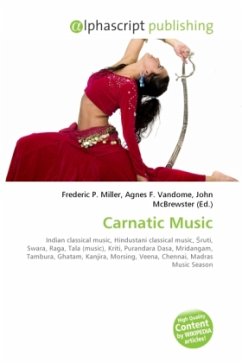Carnatic music (Sanskrit: Karn aka sa g ta ) is a system of music commonly associated with the southern part of the Indian subcontinent, with its area roughly confined to four modern states of India: Andhra Pradesh, Karnataka, Kerala, and Tamil Nadu. It is one of two main sub-genres of Indian classical music that evolved from ancient Hindu traditions; the other sub-genre being Hindustani music, which emerged as a distinct form due to Persian and Islamic influences in North India. In contrast to Hindustani music, the main emphasis in Carnatic music is on vocal music; most compositions are written to be sung, and even when played on instruments, they are meant to be performed in g yaki (singing) style. Although there are stylistic differences, the basic elements of ruti (the relative musical pitch), swara (the musical sound of a single note), r ga (the mode or melodic formulæ), and tala (the rhythmic cycles) form the foundation of improvisation and composition in both Carnatic and Hindustani music. Although improvisation plays an important role, Carnatic music is mainly sung through compositions, especially the kriti (or kirtanam); a form developed between the 16th and 20th centuries by prominent composers, such as Purandara Dasa and the Trinity of Carnatic music.
Bitte wählen Sie Ihr Anliegen aus.
Rechnungen
Retourenschein anfordern
Bestellstatus
Storno








